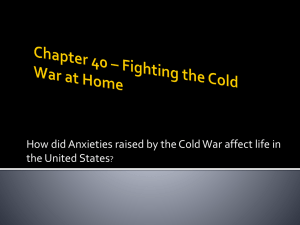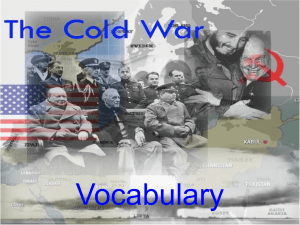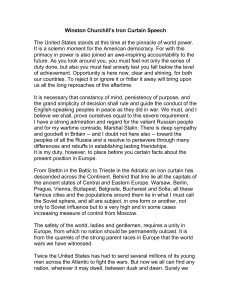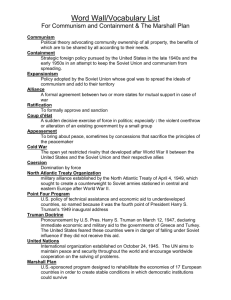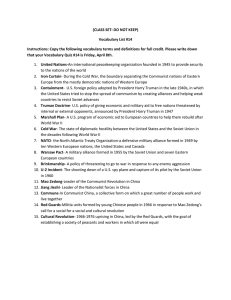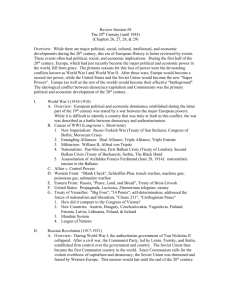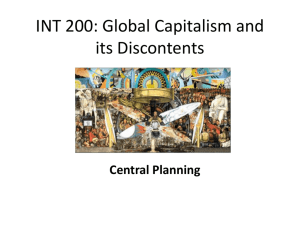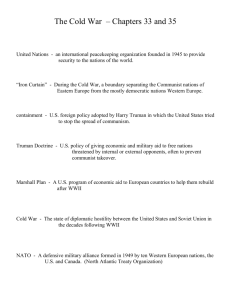World History Final Exam Study Guide
advertisement
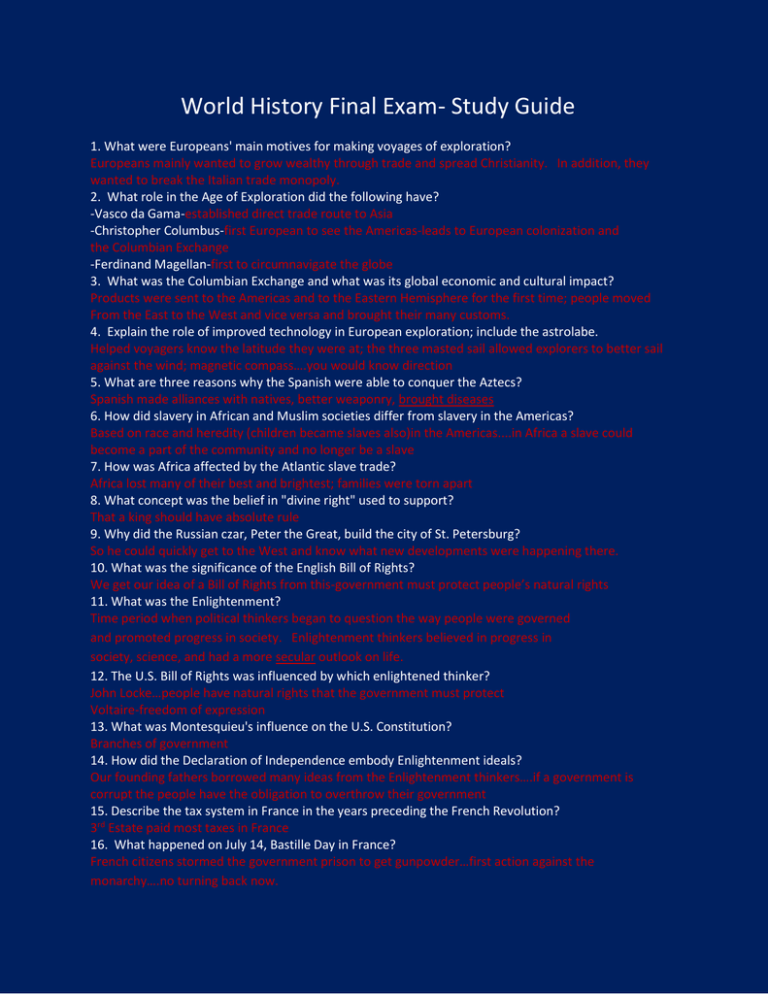
World History Final Exam- Study Guide 1. What were Europeans' main motives for making voyages of exploration? Europeans mainly wanted to grow wealthy through trade and spread Christianity. In addition, they wanted to break the Italian trade monopoly. 2. What role in the Age of Exploration did the following have? -Vasco da Gama-established direct trade route to Asia -Christopher Columbus-first European to see the Americas-leads to European colonization and the Columbian Exchange -Ferdinand Magellan-first to circumnavigate the globe 3. What was the Columbian Exchange and what was its global economic and cultural impact? Products were sent to the Americas and to the Eastern Hemisphere for the first time; people moved From the East to the West and vice versa and brought their many customs. 4. Explain the role of improved technology in European exploration; include the astrolabe. Helped voyagers know the latitude they were at; the three masted sail allowed explorers to better sail against the wind; magnetic compass….you would know direction 5. What are three reasons why the Spanish were able to conquer the Aztecs? Spanish made alliances with natives, better weaponry, brought diseases 6. How did slavery in African and Muslim societies differ from slavery in the Americas? Based on race and heredity (children became slaves also)in the Americas....in Africa a slave could become a part of the community and no longer be a slave 7. How was Africa affected by the Atlantic slave trade? Africa lost many of their best and brightest; families were torn apart 8. What concept was the belief in "divine right" used to support? That a king should have absolute rule 9. Why did the Russian czar, Peter the Great, build the city of St. Petersburg? So he could quickly get to the West and know what new developments were happening there. 10. What was the significance of the English Bill of Rights? We get our idea of a Bill of Rights from this-government must protect people’s natural rights 11. What was the Enlightenment? Time period when political thinkers began to question the way people were governed and promoted progress in society. Enlightenment thinkers believed in progress in society, science, and had a more secular outlook on life. 12. The U.S. Bill of Rights was influenced by which enlightened thinker? John Locke…people have natural rights that the government must protect Voltaire-freedom of expression 13. What was Montesquieu's influence on the U.S. Constitution? Branches of government 14. How did the Declaration of Independence embody Enlightenment ideals? Our founding fathers borrowed many ideas from the Enlightenment thinkers….if a government is corrupt the people have the obligation to overthrow their government 15. Describe the tax system in France in the years preceding the French Revolution? 3rd Estate paid most taxes in France 16. What happened on July 14, Bastille Day in France? French citizens stormed the government prison to get gunpowder…first action against the monarchy….no turning back now. 17. Which document stated that "men are born and remain free and equal in rights"? Declaration of the Rights of Man-during the French Revolution-“Men are born and remain free and equal in rights”. The French Revolution followed these ideals. 18. How did Napoleon rise to power? By a coup-d’etat 19. What role did geography play in Napoleon’s defeat? Napoleon’s forces were caught in the Russian winter thousands of miles from France. 20. What were the consequences of France’s defeat for Europe? Absolute monarchies were reinstated in Europe & there existed a balance of power in Europe and peace for 100 years 21. What strategy did Czar Alexander I use to defeat Napoleon in Russia? Retreat and burn everything in the path of the enemy to not allow them to have your food and captured supplies-this is called the scorched earth policy 22. What were the three factors of production required to drive the industrial revolution? Land, Labor, Capital 23. What was the main cause of the process of urbanization that occurred in 19th-century Britain and Western Europe? Industrialization 24. What is the laissez-faire policy? A policy that let owners of industry set working conditions without government interference 25. Who were Karl Marx and Adam Smith? Marx-Wrote “The Communist Manifesto” in 1848. First comprehensive book on the ideas of communism. Smith-Wrote “Wealth of Nations” in 1776. It was the first comprehensive book on the ideas of capitalism. 26. How did the impact of worldwide industrialization effect the relationships between industrialized nations and non-industrialized nations? Often Industrialized nations exploited non-industrialized nations….imperialism 27. What is imperialism? When a more powerful country controls another country to exploit its people and land. 28. What were some of the positive and negative effects of imperialism? Europeans brought new technologies, healthcare, new medicines, education Europeans forced the people to work for them and took over their natural resources 29. What happened as a result of the Berlin Conference of 1884-1885? European countries carved up Africa. No African leaders were present. 30. Who benefited the most from the granting of extraterritorial rights in 19th century China? Europeans and the United States 31. Why did Britain sell opium to China? Great Britain had finally found a profitable product the Chinese would buy 32. What were the underlying causes of WWI? Imperialism, Militarism, Alliances, Nationalism 33. What event in Sarajevo ignited the Great War? Assassination of the Archduke Franz Ferdinand 34. Describe conditions on the war front for soldiers. Fought in trenches; often defensive warfare 35. What new technologies were first used extensively in WWII? Automatic Machine Gun, Poison gas, tank, Airplane, submarine 36. Which nation's actions caused the United States to fight in World War I? Germany 37. What did the war become once the participating countries began devoting all of their resources to the war effort? Total War 38. What gamble did Germany make before the United States entered the WWI? Unrestricted submarine warfare 39. How did the Treaty of Versailles affect postwar Germany? Left a legacy of bitterness and hatred in the German people 40. What was the mandate system? How did it replace the Ottoman control? Another power controls a country until a stable government can be established. Great Britain and France controlled lands in the Middle East like Iraq after the Ottoman Empire collapsed. 41. What led to the end of Romanov rule? Disastrous policies by Nich. II led to the Russian Revolution…ended their dynasty 42. Explain the causes and results of the Russian Revolution Disastrous policies by Nich. II led to the Russian Revolution and the Bolsheviks taking advantage of this climate. 43. What was the purpose of Stalin’s Five Year Plan? Was it successful? Catch up with the rest of the industrial world. Yes…but at the expense of many lives and freedoms 44. What is a totalitarian state? Government controls the public and private lives of its people 45. What steps took place in the transformation of the Soviet Union into a totalitarian state? Government took over industries, religion, the press, implemented 5 yr. plans, etc. 46. Why did Chinese peasants align themselves with the Communists rather than the Nationalists? What was the significance of this? Communists helped the peasants more……tens of millions of peasants helped the communists win. 47. Why did millions of Germans turn against the leaders of the Weimar Republic? It had signed the Versailles Treaty. 48. What ideal does fascism stress? Racial superiority and extreme nationalism 49. Why did fascism have such a strong appeal after WWI? People were looking for bold leaders with bold promises after WWI 50. The Munich Conference came to symbolize the dangers of what? Appeasement…..giving in to an aggressor in hopes that they will stop 51. What was the result of Germany’s invasion of Poland? Two days later, Great Britain and France declared war 52. Why did the Japanese attack Pearl Harbor? To dismantle our naval fleet and buy time to establish for themselves a Pacific empire 53. What occurred in the Philippines immediately following Pearl Harbor? Bataan Death March-Japanese forced American POW’s to march 60 miles in intense heat to their Prisoner of war camp…..many died on this march 54. What was significant about the Doolittle raid? First successful mission after Pearl Harbor against the Japanese; lifted U.S. fighting morale 55. What was significant about the Battle of El-Alamein? Battle of Stalingrad? D-Day? Midway? El Alamein-1st turning point in WWII-Germans pushed out of North Africa Stalingrad-2nd turning point in WWII-Germans pushed back by the Soviets until the end of the war D-Day-Allies storm the beaches of France-push Germans back from the west until the end of the war Midway-1st turning point in the Pacific theater against Japan 56. Explain the relationship between Nazi ideology and policies which led to the Holocaust. Believed in the Aryan race to be the master race…..believed that Jews were evil and inferior and should be killed. 57. How did the Lend-Lease Act benefit the United States? We sent supplies to the Allies and made huge profits before we entered WWII 58. How were the Holocaust and Hitler's "Final Solution" related? The Final Solution was the plan to kill all the Jews. Six million died in the extermination camps. This genocide is called the Holocaust. 59. How did civilians join in the WWII war effort? The worked in factories, bought war bonds, rationed food, etc. 60. Why were thousands of U.S. citizens put in internment camps during the WWII? These were Japanese-Americans who were sent to internment camps after Pearl Harbor. The government believed they might aid in some way Japan during the war. 61. Which was addressed by the Nuremberg Trials? These were the trials of the Nazi’s after the war. Many were tried for crimes against humanity for their role in the Holocaust. 62. What did the Allies' strategy of "island hopping" in the Pacific involve? Defeating the Japanese on each and every Pacific island in preparation for a land invasion of the Japanese mainland. 63. What does the use of kamikaze pilots show about Japanese culture? That the Japanese valued national honor over the individual. 64. Why did President Truman agree to use the atomic bomb? To quickly end WWII in the Pacific 65. What contributed to the breakdown of the alliance between the United States and the Soviet Union? The three main factors were: a) The Soviet Union would not allow free elections in Eastern Europe, b) We believed the Soviet Union was intent on spreading Communism around the world, c) The U.S. wanted to spread democracy and capitalism around the world. 66. What was the purpose of the Marshall Plan? It provided economic aid to Western European countries to promote democracy and capitalism 67. What was the purpose of the United Nations? It would be an international organization to promote peace around the world 68. Explain MacArthur’s plan for Japan. Demilitarize it and write a new constitution 69. What was the policy of Containment? This was the foreign policy approach of many presidents during the Cold War. Foreign policy would in carried out in such a way as to contain the spread of communism 70. What was the purpose of the Truman Doctrine? The Truman Doctrine said that the U.S. would provide military or economic aid to any country vulnerable to communism 71. How did the state of Israel form? What role did geography play in its development? After the Holocaust world opinion supported the Jews to have a homeland. 72. How did the development of the hydrogen bomb (1952) impact the arms race? It increased it dramatically between the U.S. and the Soviet Union 73. What was the purpose of NATO & the Warsaw Pact? These were military alliances to protect countries under attack from members of the other alliance 74. Why did Winston Churchill call Europe an “Iron Curtain”? Europe was divided between those countries that were communist and those that were democratic and capitalist. Little interaction occurred between these countries…….as if an “Iron Curtain” had descended across Europe. 75. How did the U.S. respond to Sputnik (1957)? It significantly increased government spending on education and technology. 76. What is brinkmanship? Using the threat of nuclear war to get what you want……Cuban Missile Crisis is a famous example of this. 77. Define the Cold War A state of heightened tension and hostility between the United States and its allies and the Soviet Union and its allies. 78. Why was the Korean War fought? What resulted? North Korea attacked South Korea in 1950. The United Nations send troops (mostly U.S.) to defend South Korea. The war resulted in the 38th parallel remaining the dividing line in Korea. The war has officially never ended. The Korean War was an example of the U.S. following containment. 79. How was China transformed after the Chinese Civil War? China became a communist country; in recent years, the government has allowed more capitalism into the country 80. Who led the Nationalists? Who led the Communists? Chiang Kai-shek led the nationalists Mao Zedong led the communists 81. What was the Great Leap Forward (1958)? An attempt by the Chinese government to more fully implement communism in the country. Ultimately it failed; Mao was temporarily unpopular; and it led to the Cultural Revolution 82. How did the "Bay of Pigs" failure lead to the Cuban missile crisis? Our C.I.A. trained Cuban rebels to overthrow the Fidel Castro government. It failed. The Soviet Union perceived that the U.S. was weak and so they decided it was a good time to try to put missiles on the island of Cuba so the U.S. would never try to attack communist Cuba again. 83. Why did Mao end the Cultural Revolution (1966)? Many of the best and brightest in China had been executed or sent to labor camps. Mao realized this and ended the Red Guards organization 84. Why was the Vietnam War fought? What resulted? To contain communism and keep South Vietnam democratic and capitalist. U.S. forces left and Vietnam became communist. 85. Who were the Vietcong? South Vietnamese communists who fought guerilla warfare against the South Vietnamese army and the U.S. 86. How did SALT (1972) impact the arms race? Agreement between the U.S. and the Soviet Union to limit the amount of nuclear missiles each country had. 87. How did the Soviet Union’s invasion of Afghanistan end détente? We were angry at the Soviet Union for trying to spread communism into Afghanistan. It ended our brief period of friendship with the Soviet Union. 88. What factors led to the end of the Cold War? -The Soviet leader Michael Gorbachev in 1985 implemented the reforms of Glasnost and Perestroika. The Soviet people clamored for more reforms. -The Soviet economy could not keep up with the military buildup of the United States. 89. What extremist Islamic group seized control of Afghanistan during the 1990s? The Taliban 90. Why does the U.S. have troops in Afghanistan? To hunt down Al Qaeda members, make sure the Afghan government does not allow terrorists to operate out of Afghanistan, and help establish a stable government there
